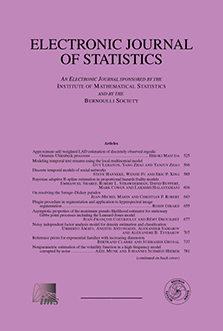Abstract
Modern multiscale type segmentation methods are known to detect multiple change-points with high statistical accuracy, while allowing for fast computation. Underpinning (minimax) estimation theory has been developed mainly for models that assume the signal as a piecewise constant function. In this paper, for a large collection of multiscale segmentation methods (including various existing procedures), such theory will be extended to certain function classes beyond step functions in a nonparametric regression setting. This extends the interpretation of such methods on the one hand and on the other hand reveals these methods as robust to deviation from piecewise constant functions. Our main finding is the adaptation over nonlinear approximation classes for a universal thresholding, which includes bounded variation functions, and (piecewise) Hölder functions of smoothness order $0<\alpha \le1$ as special cases. From this we derive statistical guarantees on feature detection in terms of jumps and modes. Another key finding is that these multiscale segmentation methods perform nearly (up to a log-factor) as well as the oracle piecewise constant segmentation estimator (with known jump locations), and the best piecewise constant approximants of the (unknown) true signal. Theoretical findings are examined by various numerical simulations.
Citation
Housen Li. Qinghai Guo. Axel Munk. "Multiscale change-point segmentation: beyond step functions." Electron. J. Statist. 13 (2) 3254 - 3296, 2019. https://doi.org/10.1214/19-EJS1608
Information





